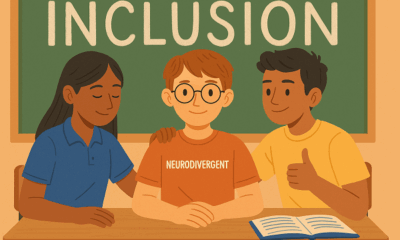Education
Teacher training trends in Asia
Vaidehi K N pens down teacher training trends in Asia.
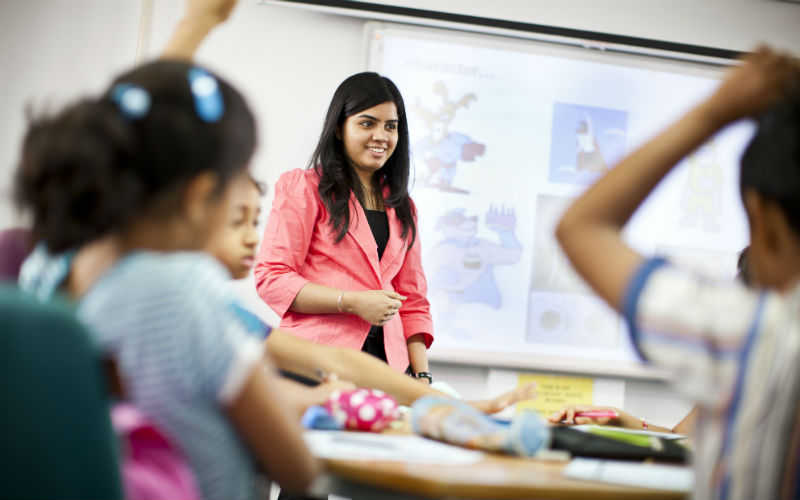
Global socioeconomic trends and cultural changes pose new challenges for ECE teachers in 21st century. Rising parent expectations around learning outcomes, are creating opportunities for those who are ready. Thus a teachers’ role in early childhood setting is much more demanding and challenging.
Thus teachers are the cornerstone of educational development and ‘good schools require good teachers’. Teachers are at the forefront of the process of educational reform, since the quality and effectiveness of any education system ultimately depends on the quality and nature of the interaction that occurs between learners and their teachers.
THE CURRENT SCENARIO
For most of USA, Europe, Australia and New Zealand, school readiness is around behavioural, emotional and motor skills, not academic standards. In Asia including India the demand from parents is more aorund academic excellence and readiness! Though this is taking a paradigm shift.
Asia is engaged in an educational movement in this decade to transform the traditional academic- and instruction-driven education into inquirybased and child-centered approaches involving critical thinking as the core. ECE teachers in India now have to possess skills to handle students’ varied interests, talents, and creativity in addition to academic knowledge.
“Teach Less, Learn More” is the new mantra in ECE and for all the right reasons. Teachers who earlier were abiding by the prescriptive curriculum are now forced to acquire new skills to handle the paradigm shift to inquiry based learning with critical thinking. It requires teachers to reorient themselves to align their beliefs and practices with the global trends in education.
The encouragement of conducting “learning by doing” activities throughout a wide range of fields replaces the traditional content-valued education. The objective is to focus on each child’s holistic developmental needs by a child centered integrated curriculum.
How to address the tension between achieving “success” in academic knowledge, and attaining the goal of valuing children’s creativity and diverse ways of thinking, are still evolving. Asia thus is at a critical point of this transformation journey being closely mentored by government agencies and global organisations.
TRENDS IN CHINA
China’s educational system has made great progress. The nine-year compulsory education has been basically universalised in 2000. Politicians, parents, and the general public challenge the quality of teacher education in China, and therefore the reform of the curriculum of teacher education is a very hot topic in teacher education institutions. In general, everybody agrees that the complex knowledge structure for teachers comprises subject-matter knowledge, conditional knowledge (knowledge about pupils’ development, knowledge about learning and teaching, knowledge about assessment and evaluation, etc.), practical knowledge, and cultural knowledge. But there is lack of common understanding about what should be the proportion of those kinds of knowledge or where the emphasis should be put.
China has raised the qualification standards by the establishment of Master of Education professional degree. Now comprehensive universities like Beijing and Peking unversities have started to prepare ECE teachers. The undergraduate programs will emphasise general education and foundations of major fields as in ECE. The majors will be widened to cover interdisciplinary or multi-disciplinary studies including ECE. ECE teaching institutions are raising their standards and improving their quality of education to promote professionalisation of teachers by including global stadards. Teachers are still not regarded as full professionals by many policy-makers or the general public in China.
TRENDS IN MALAYSIA
During the ’60s and ’70s after years of independence, there was an urgent need to recruit enough teachers to staff the newly built classrooms. To ease the acute shortage of teachers in ECE and primary schools, many untrained teachers with academic qualifications as low as Form 3 (which is equivalent to nine years of general education) were recruited and given part-time training during the weekends and school holidays in training colleges and regional training centers. To staff the secondary schools, many graduate teachers were imported from the United Kingdom and India.
The goals of teacher education have changed over the years according to the pressing needs of the education system. Consequently, different types of teacher education programs have been developed to cater to the following priorities at different points in time:
a) to ensure that enough teachers of the various levels needed by the schools are recruited and trained;
b) to raise the quality of teachers;
c) to train enough teachers in specialised subjects like ECE, English, science, and mathematics;
d) to provide sufficient trained teachers for vocational and technical schools;
e) to provide training for upgrading, professional development of practicing teachers; and
f) to provide professional training for all kinds of practitioners in the education system, including school counselors, school principals, teacher educators, curriculum developers, and others.
The teacher-training curriculum is focusing on:
a) Teacher Dynamics – Soft skills, child psychology in ECE, language and thinking skills, Islamic education, Moral and environmental education.
b) Knowledge and Professional Competence – Psychology, pedagogy, and guidance and parent counseling.
c) Self-enrichment – art education and physical and health education/games.
d) Co-curricular activities – management of co-curricular activities, games, athletics, uniformed units, and societies.
The teaching profession and ECE does not attract the most talented young people and less male teachers.
ECE Teaching is not very attractive, partly because of its low social status and partly because a teacher’s job is very complex and demanding. Therefore, better pay and incentives are being provided to attract talented young people to the teaching profession.
The quality of teacher training is being improved by paying attention not only to the intellectual qualifications of future teachers but also the characteristics of their personalities, and the working conditions for teachers are improved to include a better career structure with more promotion and professional development opportunities.
In all ECE teacher education programmes, the practicum is being made mandatory which attempts to link theory and practice of teaching. This there has been a shift from the technical-rational model to the reflective practitioner model.
TRENDS IN INDIA
India has a long tradition of teaching and learning. Traditionally, the society entrusted young ones to the learned scholar known as guru with full confidence and faith: the guru looked after all the learning needs of the learner, including the total development of the personality.
There is a serious imbalance of availability of qualified/trained ECE teachers in the country. In many regions, ECE trained teachers are not available; this has led to untrained teachers being appointed.
It is widely acknowledged that teacher education has not yet acquired the requisite status as a profession like engineering, medicine, and business management. The community and parents still do not give much credibility to the training aspect of teachers in schools.
ECE teacher training and general teacher training are preparing teachers to integrate indigenous knowledge in theory and practice; developing among them an understanding of the impact of globalisation, privatisation and information and communication technology; fostering among teachers as well as in the students the interest for life long learning; empowering teachers to inculcate at every stage values among students; enabling teachers to establish linkages with parents and the community; developing among teachers the competencies to deal with differently abled students; orienting teachers in modern techniques of evaluation; etc.
Specialised training on parent management is part of the ECE training as parents’ expectations are very high and students are demanding! Teacaher concerns around career advancement, placement opportunities, professional development, and transparency in upward mobility scenario are being addressed. New systems are evolving to provide professional feedback to the teachers and thereby contribute to their professional growth.
There is immediate emphasis on retraining and reorganising existing ECE teachers, making most of them competent in their profession and to the new curriculum challenges. A new type of educational institution called the District Institute of Education and Training (DIET) has been conceived within the National Policy on Education (NPE) and the Ministry of HR as major steps towards effective teacher education. The DIET is designed to improve and enrich the academic background of ECE and elementary school teachers.
Training in models of ECE teaching (concept attainment, inquiry training and critical thinking) in the form of lecture, demonstration, discussion and peer practice feedback has been put in place to enhance the understanding and competence of both teacher educators and student teachers in using the models of teaching. Teaching in these models also brought about significant favourable changes in the attitudes of both teacher educators and student teachers towards new models and their willingness to implement them in teacher training programmes. School students taught through these models also responded favourably to them.
In the long-term, helping teachers at the beginning of their training definitely sounds like a good investment. After all, before you can become a good teacher, don’t you have to have the opportunity to be a good student?
Vaidehi K N is Managing Partner, Podar Jumbo Kids Banashankari and Sarjapur.
Image Courtesy: ucl
Education
Daring to Dream: Six Years in the Heart of Rural Rajasthan
Across India’s government schools, millions of students are first-generation learners—navigating education without inherited privilege or guidance. Dare To Dream, a documentary filmed by Ranu Ghosh over six years in rural Rajasthan, brings these lived realities into focus through the stories of young girls from the Rabari community. This feature (like the documentary) explores how education becomes dignity, protection, and possibility—and why such stories matter deeply to classrooms, educators, and communities across the country.

The journey of a thousand miles begins with a single step. For many girls in India’s rural communities, that step is often blocked—by tradition, by circumstance, and by expectations set long before they are old enough to question them.
In Banswara district of southern Rajasthan, filmmaker Ranu Ghosh spent six years documenting what it means to take that step anyway. The result is Dare To Dream, a documentary that offers an intimate, unflinching look at first-generation learners, gender, and education within the Rabari community—a community rich in cultural knowledge yet constrained by rigid social norms that frequently limit the lives of its daughters.
A community of knowledge—and contradiction
The Rabaris are globally recognised for their generational expertise in camel breeding and their close relationship with nature, mobility, and craft. Their cultural heritage is admired and celebrated, yet the community remains socially isolated, shaped by traditions that are slow to evolve.
Within this context, women often face early marriage, restricted mobility, and limited access to education—realities rarely portrayed with nuance in mainstream narratives. Dare To Dream avoids simplistic portrayals of victimhood. Instead, it presents a layered reality where hardship coexists with dignity, resilience, and quiet strength.

“There is a constant struggle to balance tradition with modernity,” Ghosh observes. “These communities are trying to preserve their identity while adapting to a world that often does not accommodate their way of life.”
The invisible journey of first-generation learners
For many students in India’s government schools, education is a journey undertaken without a map. These are first-generation learners—children whose parents never had the opportunity to complete, or even begin, formal schooling.
“For them, education is not only about studying subjects,” says Ghosh. “It is about dealing with uncertainty, responsibility, and self-doubt from a very young age.”
Their challenges are layered. Academic support at home is limited, financial insecurity is constant, and schooling must often be balanced with household responsibilities and strong social expectations. Beyond these visible constraints lies a quieter, internal struggle—whether it is acceptable to aspire at all.
Yet Dare To Dream shows that ambition persists even within these limits. The aspirations of these children are shaped not by entitlement, but by resilience and determination. Every milestone—learning English, completing a grade, staying in school a little longer—becomes a meaningful act of perseverance.
“Dreaming,” Ghosh notes, “is not a privilege. It is a right.”
When education becomes protection
The documentary’s emotional core lies in the contrasting journeys of three women, revealing how education shapes lives in profoundly different ways.

Ganeshi’s story is one of quiet defiance. Married at a very young age, she was unusually allowed to remain at her parents’ home to continue her education. She later became the first English secondary-level teacher from her community in a government school—moving to her in-laws’ home only after securing her job.
Her sister, Swapna, followed a similar path. She completed her education, found employment, and married later, breaking a cycle that had long seemed inevitable.
In contrast, Reena’s story shows what is lost when education is cut short. Married before completing school, she became a mother too early and passed away at just twenty-nine.
“Education is more than opportunity,” Ghosh reflects. “It is protection, voice, and hope. When girls are denied education, what is taken away is not just learning, but the chance to choose.”
Why these stories matter in classrooms
Ghosh believes that audio-visual storytelling has a unique ability to reach young people—especially those who rarely see their own lives reflected in books or media. Even in remote regions, mobile phones and social media are deeply embedded in everyday life.
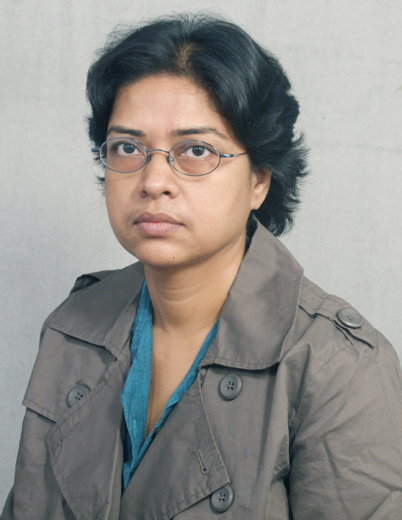
“When students see lives similar to their own on screen,” she says, “they begin to feel seen. They realise that their experiences and struggles matter.”
She hopes screenings of Dare To Dream in villages and government schools can affirm students’ aspirations
while also serving as a reminder to educators of the influence they hold.
“Sometimes,” she adds, “a small gesture of encouragement from a teacher can change the course of a child’s life.”
For communities, the film creates space for dialogue—about education, gender, early marriage, and the difficult balance between tradition and change. Importantly, these conversations emerge without judgement, allowing reflection rather than resistance.

Beyond slogans, towards quiet change
After six years of documenting these lives, Dare To Dream leaves behind a powerful truth: meaningful change is often incremental. It unfolds in classrooms where teachers persist, in families that choose education over early marriage, and in girls who dare to imagine futures different from those prescribed to them.
If the film succeeds in helping even a few girls take one step closer to that freedom, it reinforces a larger truth—when first-generation learners from marginalised communities are trusted and supported, they do not just change their own lives. They reshape the future of others as well.
Education
Tapas Project Shaala 2026 to Spark National Dialogue on Autonomy, Curiosity and Community in Education
At ScooNews, we are proud to partner with Tapas Education for an event that prioritizes authentic narratives over abstract theory. Whether you are a school leader navigating institutional change or a parent nurturing curiosity at home, TPS 2026 offers a rare, reflective space to bridge the gap between educational philosophy and real-world practice.
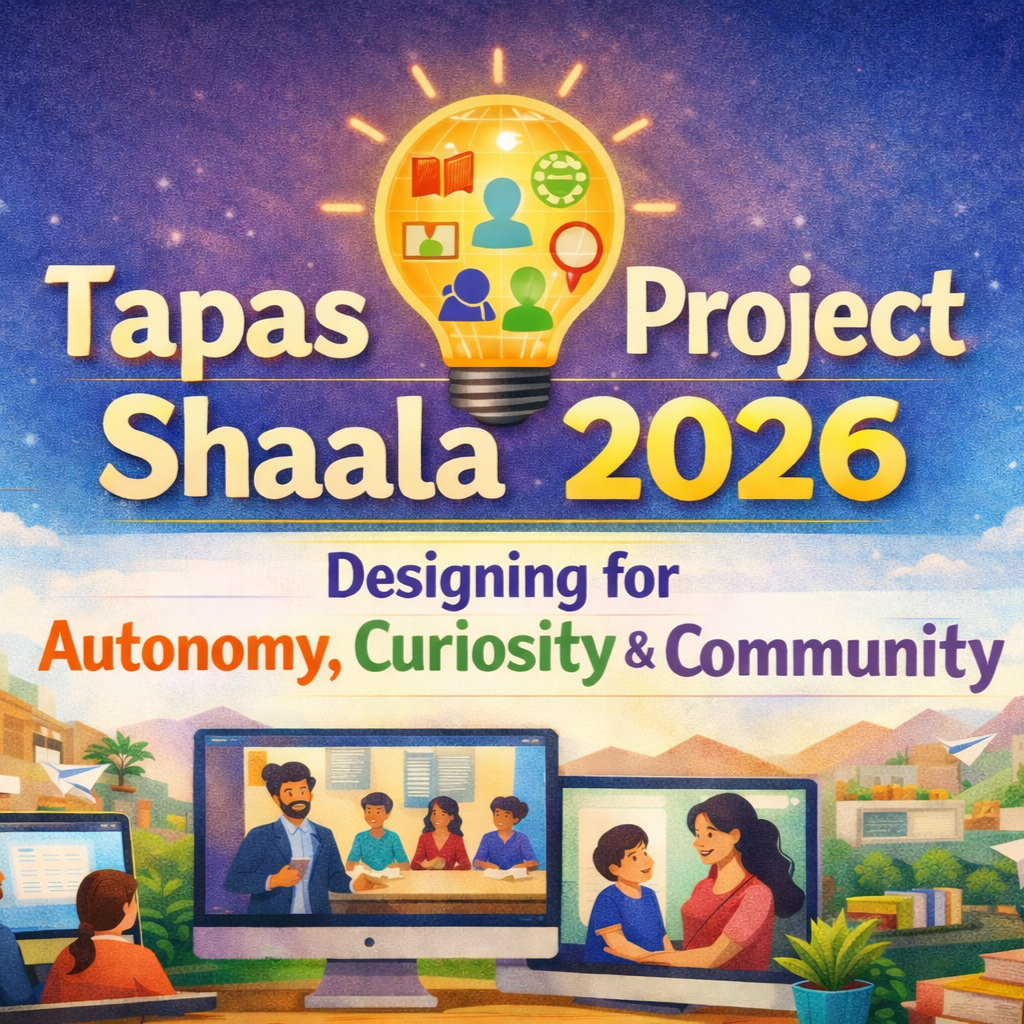
India | February 2026
Tapas Education has announced the launch of Tapas Project Shaala 2026 (TPS 2026), a four-day virtual education conference built around the theme Designing for Autonomy, Curiosity & Community. Scheduled from 19 to 22 February 2026, the conference will bring together educators, parents, home educators, learning designers, school leaders, researchers, and community voices from across India and internationally.
Designed as a reflective and practice-driven platform, TPS 2026 aims to spark meaningful dialogue on how learning is designed, experienced, and sustained in a rapidly evolving educational landscape.
Each day of the conference will feature carefully curated keynote sessions, panel discussions, and conversations led by distinguished educators, researchers, and global contributors. The programme will explore themes including learner autonomy, curiosity-driven learning environments, community-connected education, early years foundations, leadership, and the future of schooling.
Unlike traditional conferences that focus heavily on theory, TPS 2026 places strong emphasis on lived experiences and real-world challenges. Sessions will spotlight authentic narratives, dilemmas, trade-offs, failures, and decisions shaping classrooms and institutions today.
The conference is intentionally designed for multiple stakeholders.
Educator-focused sessions will address pedagogy, leadership, assessment, and learning design. Parent-centric conversations will offer practical perspectives on nurturing independence, resilience, and emotional security at home. Additionally, architects, designers, and learning space innovators will gain insights into how educational philosophy and leadership choices influence physical, digital, and shared learning environments.
TPS 2026 will be hosted entirely online, enabling wide participation without geographical constraints.
Tapas Education has partnered with ScooNews as an event partner to support visibility and outreach for the conference.
Event Details
Event: Tapas Project Shaala 2026
Theme: Designing for Autonomy, Curiosity & Community
Dates: 19 to 22 February 2026
Mode: Virtual
Website: www.tapaseducation.com
Registration: https://forms.gle/
Education
Judicial Guardrails: How the J&K High Court’s Fee Regulation Verdict Redraws the Rules for Private Schools
In a judgment that goes far beyond school fees, the High Court of Jammu & Kashmir and Ladakh has reset the conversation around private education governance. By reaffirming institutional autonomy while retaining safeguards against profiteering, the ruling signals a shift toward smarter, evidence-based regulation. For school leaders, policymakers, and parents alike, this decision offers both reassurance and a roadmap for how India’s evolving education ecosystem might be governed in the years ahead.
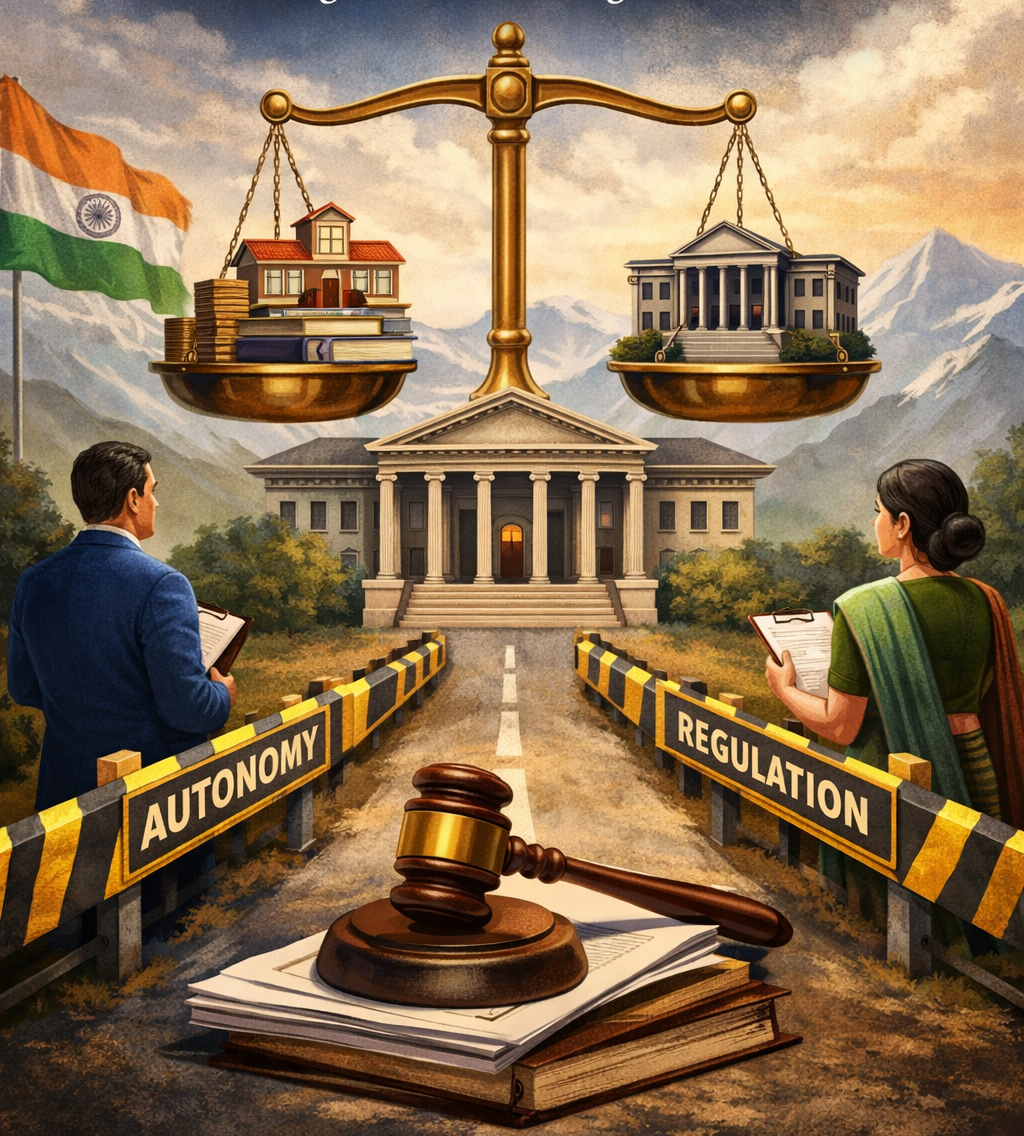
A Courtroom Decision That Echoes Across Classrooms
Every so often, a legal judgment does more than resolve a dispute—it reframes an entire conversation.
The recent ruling of the High Court of Jammu & Kashmir and Ladakh in New Convent High School & Ors vs Union of India is one such moment. While the immediate issue concerned fee regulation, the implications extend to the deeper question that has shaped Indian education policy for decades:
Who should decide how private schools operate—the State, or the institutions themselves?
The Court’s answer is neither absolute freedom nor rigid control. Instead, it draws a clear set of judicial guardrails—protecting institutional autonomy while preserving regulatory oversight to prevent exploitation.
From Supplementary to Structural: The Private School Reality
Perhaps the most striking element of the judgment is its candid acknowledgement of a reality educators and parents already understand.
Private schools are no longer merely supplementary to government schooling. In many regions, they have become structurally central to delivering education.
Families across socio-economic segments increasingly choose private institutions because of:
-
Perceived better learning outcomes
-
Stronger infrastructure
-
Greater accountability
This acknowledgement matters because it shifts the policy lens from ideology to practicality. Regulation designed for a marginal sector no longer fits a system where private institutions educate a significant proportion of children.
The End of Executive Overreach
At the heart of the case was the composition of the Fee Fixation and Regulation Committee (FFRC). A provision allowed a senior government officer to head the body.
The Court ruled that regulatory mechanisms exercising quasi-judicial powers must be independent. By reaffirming that such committees should be chaired by a retired High Court judge, the Bench effectively insulated fee oversight from administrative influence.
For the education ecosystem, this is a structural shift:
-
Greater procedural fairness
-
Increased confidence among institutions
-
More credibility in regulatory decisions
In essence, the Court strengthened the legitimacy of regulation—rather than weakening it.
Education: Neither Charity Nor Commerce
One of the most important clarifications in the judgment concerns the economics of schooling.
The Court reiterated a long-standing legal principle: running a school is a constitutionally protected occupation.
This has several implications:
-
Schools may generate a reasonable surplus
-
Investment in infrastructure and faculty is legitimate
-
Financial sustainability is necessary
What remains prohibited is profiteering—defined as excessive or exploitative gain.
This distinction is critical in a policy environment where financial viability is often confused with commercialization.
Quality education requires:
-
Qualified teachers
-
Modern facilities
-
Technology
-
Safe transport
All of these demand sustained investment.
Smarter Regulation, Not Blanket Control
Another major takeaway is the Court’s push toward proportionate oversight.
Rather than attempting to scrutinize every school equally, regulatory authorities are encouraged to:
-
Focus on cases where credible complaints arise
-
Examine institutions where fee levels appear unreasonable
-
Ordinarily accept fee proposals supported by documentation
This is essentially a call for risk-based regulation—a governance model common in mature regulatory systems.
It recognises a simple truth: excessive micro-management can harm quality as much as inadequate oversight.
The Transport Fee Conversation
The judgment also addressed the long-standing friction around school transport fees.
It noted that transport services are optional facilities provided for parental convenience—not mandatory for school recognition.
The Court recommended that any fee determination in this area involve domain experts—transport authorities, fuel cost data, and related agencies—to ensure realism and transparency.
This highlights an important gap in many regulatory systems: decisions often lack sector-specific cost benchmarking.
Key Takeaways
For the Education Sector
-
Private schools are now structurally embedded in India’s education ecosystem.
-
Financial sustainability is legitimate; profiteering is not.
-
Regulatory independence is essential for credibility.
For Policymakers
-
Blanket fee controls are less effective than evidence-based oversight.
-
Public education reform remains urgent and central.
-
Regulation must balance equity with institutional viability.
For Parents
-
Safeguards against exploitation remain intact.
-
Transparency in fee determination is being strengthened.
What’s In It for Me? (School Leaders Edition)
1. Greater Institutional Confidence
The judgment reinforces that:
-
Schools retain autonomy in proposing fee structures.
-
Regulatory decisions must follow due process.
2. Financial Sustainability Is Legitimate
Reasonable surplus for:
-
Infrastructure
-
Faculty quality
-
Expansion
is not only permitted—it is recognised as necessary.
3. Transparency Is Now Strategic, Not Optional
Clear documentation of:
-
Costs
-
Investments
-
Salary structures
will strengthen credibility during regulatory review.
4. Reduced Risk of Arbitrary Intervention
Authorities are expected to intervene primarily when:
-
Complaints arise
-
Fee structures appear excessive
This creates a more predictable operating environment.
5. A Shift Toward Collaborative Governance
The ruling signals an emerging model where:
-
Schools and regulators are partners
-
Oversight is consultative rather than adversarial
The Larger Policy Question India Cannot Ignore
Perhaps the most uncomfortable yet necessary observation in the judgment is its implicit challenge to governments.
Regulating private schools cannot compensate for weaknesses in the public system.
If private institutions are expanding because parents seek reliability and quality, the long-term solution lies not in tighter control alone, but in strengthening government schools.
India’s future education landscape will likely depend on a balanced ecosystem where:
-
Public schools ensure equity
-
Private schools drive innovation
-
Regulation ensures fairness
The Road Ahead: From Control to Collaboration
The High Court’s verdict does not dismantle regulation. It refines it.
It suggests a governance model built on:
-
Independence
-
Transparency
-
Proportional oversight
-
Institutional accountability
For India’s education sector, the message is pragmatic:
Autonomy and accountability are not opposing forces—they are mutually reinforcing.
If applied thoughtfully, this ruling could mark the beginning of a more mature policy phase—one where the focus shifts from controlling institutions to enabling quality.
Because in the end, the real beneficiary of balanced governance is neither the State nor the school—it is the student.
Education
Supreme Court’s Landmark Judgment for Schools: Menstrual Health is a Fundamental Right
In a transformative judgment delivered on January 30, 2026, the Supreme Court of India has unequivocally placed menstrual health within the ambit of fundamental rights, linking dignity, education, and equality in classrooms across the country. This ruling goes beyond infrastructure mandates to address stigma, awareness, and school culture—reshaping how institutions must support adolescent girls. ScooNews breaks down what the judgment says and what it now requires every school leader to do.

In a landmark judgment that firmly connects constitutional law with everyday classroom realities, the Supreme Court of India has declared menstrual health a fundamental right, placing it squarely within the ambit of Article 21 (Right to Life with dignity) and Article 21A (Right to Education).
Delivered on January 30, 2026, by a Bench of Justices J.B. Pardiwala and R. Mahadevan, the ruling in Jaya Thakur vs Union of India goes far beyond symbolic recognition. It lays down clear, enforceable obligations for schools—government and private alike—transforming menstrual hygiene from a welfare measure into a constitutional duty.
For school leaders, this judgment marks a decisive shift: menstrual dignity is no longer optional, charitable, or discretionary. It is a core educational standard.
Why the Court Intervened
The Court acknowledged what educators and parents have long known but systems have often ignored:
lack of menstrual hygiene support is a direct barrier to girls’ education.
Absenteeism, discomfort, fear of embarrassment, inadequate toilets, and social stigma collectively push many girls out of classrooms—sometimes temporarily, sometimes permanently. By recognising menstrual health as integral to dignity and learning, the Court affirmed that no girl should ever have to choose between her education and her period.
What the Court Said
The judgment rests on three powerful principles:
- Menstrual health is inseparable from dignity and bodily autonomy, which are central to the Right to Life.
- Education cannot be meaningful if menstruation becomes a reason for exclusion, discomfort, or discrimination.
- Infrastructure alone is insufficient—social stigma, silence, and male insensitivity must also be addressed.
In a telling observation, the Court noted that “ignorance breeds insensitivity” and warned that menstrual facilities will remain underused unless schools actively dismantle stigma.
What Schools Must Now Do
The Court’s directions are both practical and time-bound, with a three-month implementation window. They fall into two clear buckets: infrastructure and ecosystem change.
-
Physical Infrastructure: The Non-Negotiables
All schools—government and private—must ensure:
- Free provision of biodegradable sanitary pads, with a preference for discreet access such as vending machines.
- Functional, gender-segregated toilets with running water, soap, privacy, and regular maintenance.
- Disabled-friendly sanitation facilities, ensuring inclusivity for all students.
- Safe and hygienic disposal systems, including covered bins and environmentally compliant solutions.
- Creation of a Menstrual Hygiene Management (MHM) Corner stocked with emergency supplies such as spare uniforms, innerwear, and hygiene kits.
The Court made it clear that absence of these facilities amounts to denial of constitutional rights.
-
Cultural & Educational Shift: The Ecosystem Solution
Perhaps the most progressive aspect of the ruling is its insistence that menstrual health is not a “girls-only issue.”
Schools are now expected to:
- Sensitise boys about menstruation as a normal biological process, removing shame, jokes, and harassment from school spaces.
- Train male teachers and staff to respond empathetically to menstruation-related needs, without interrogation or embarrassment.
- Integrate age-appropriate, gender-responsive content on menstruation and puberty into health and wellness curricula, in line with NCERT/SCERT guidance.
- Foster a school culture where menstruation is discussed openly, respectfully, and without euphemism.
The message is unambiguous: pads without dignity do not equal access.
A Clear Warning to Private Schools
The Supreme Court issued a firm caution to private institutions:
non-compliance can lead to de-recognition.
By linking menstrual hygiene directly to the Right to Education, the Court has placed accountability squarely on school managements. Compliance is no longer a matter of reputation—it is a legal obligation.
Why This Judgment Matters
This ruling represents a rare moment where law, education, health, and gender equity intersect meaningfully.
It acknowledges that:
- Equality in education requires both facilities and acceptance
- Silence around menstruation is itself a form of discrimination
- Boys and men must be part of the solution—not bystanders
For school leaders, this is an opportunity to lead with empathy, foresight, and constitutional responsibility.
The Bottom Line
The Supreme Court has drawn a clear line:
menstrual dignity is a right, not a favour.
Schools that act decisively now will not only meet compliance requirements but will also create environments where every student feels safe, supported, and respected—every day of the month.
Education
Beyond the First Bell: 5 Key Takeaways for School Leaders from Economic Survey 2025–26
The Economic Survey 2025–26 signals a definitive pivot in India’s education strategy. While infrastructure goals have largely been met, the focus now shifts to bridging the higher secondary gap and fixing a vocational training deficit that remains under 1%. For school leaders, success is no longer measured by enrolment, but by measurable competencies, digital wellness, and global readiness.

The Economic Survey 2025–26, tabled in Parliament on January 29, 2026, presents an arresting paradox. India has successfully built one of the world’s largest schooling systems—educating 24.69 crore students—yet only six out of ten learners complete higher secondary education.
For school leaders, the Survey’s message is unambiguous: the national focus is shifting from inputs (getting children into school) to impact (ensuring they learn, progress, and stay). What follows are five findings that matter most inside the school gate.
1. The “Leaky Bucket”: Transitioning from Middle to Secondary
While primary enrolment is near-universal (90.9%), the Survey identifies a structural drop-off after Class 8.
Reality check: The Net Enrolment Rate (NER) at the secondary level stands at just 52.2%.
The rural gap: Only 17.1% of rural schools offer secondary education, compared to 38.1% in urban areas. Longer travel distances and higher costs lead to significant transition losses.
What this means for schools:
- The Survey strongly backs Composite Schools (K–12 models) to reduce dropout risk.
- Schools serving Classes 6–10 should prioritise transition counselling, parent engagement, and academic bridging.
Leader takeaway: Retention, not recruitment, is now the real leadership challenge.
2. Learning Outcomes: The PARAKH Recovery Story
Post-pandemic recovery is visible, particularly in foundational years—but learning quality remains uneven across states and school types.
Encouraging gains:
- Grade III Mathematics proficiency has risen to 65%, up from 42% in 2021.
What’s next:
- The Survey proposes a PISA-like, competency-based assessment at the end of Class 10, signalling a decisive move away from rote learning.
What this means for schools:
- Internal assessments will increasingly need to mirror National Achievement Survey (NAS) benchmarks.
- Performance-linked accountability is no longer hypothetical—it is imminent.
Leader takeaway: Assessment literacy will become as important as curriculum delivery.
3. The Skilling Crisis: Addressing the 1%
Perhaps the most candid section of the Survey exposes a stark education–employment mismatch.
The 1% problem: Only 0.97% of students aged 14–18 have received formal institutional skilling.
Structural issue: Education and skilling continue to operate in parallel silos, leaving most learners academically qualified but workplace-unready.
What this means for schools:
- Vocational exposure must be embedded within Classes 9–12, not offered as an optional or external add-on.
- Partnerships with local industry, NSDC-aligned providers, and apprenticeship platforms will become critical.
Leader takeaway: Schools that integrate skills early will future-proof their students—and their relevance.
4. Digital Exposure: Pedagogy vs. Addiction
In a significant first, the Economic Survey flags digital addiction as a threat to student wellbeing, learning focus, and social capital.
The paradox:
- 89% of rural youth now have access to smartphones.
- 75% use them primarily for social media, contributing to sleep deprivation, reduced attention spans, and anxiety.
What this means for schools:
- The Survey recommends introducing a Digital Wellness Curriculum, covering:
- Screen-time literacy
- Cyber safety
- Responsible AI and social media use
Leader takeaway: Digital fluency must now include digital restraint.
5. Global Ambitions: Stemming the Student Exodus
India is on track to become the world’s largest source of international students, with outbound numbers expected to reach 18 lakhs by 2025. Yet, international students form just 0.10% of domestic enrolment.
The strategy:
- The Survey promotes “Internationalisation at Home”—inviting foreign campuses, enabling joint degrees, and ensuring mutual recognition of qualifications.
Key enablers already in place:
- Academic Bank of Credit (ABC)
- APAAR IDs (with 2.2 crore already issued)
What this means for schools:
- Senior secondary students should be actively guided on credit portability, interdisciplinary choices, and global pathways.
Leader takeaway: Global readiness is no longer optional—it is systemic.
The Bigger Shift: Learning Over Schooling
The Economic Survey 2025–26 makes one thing clear: India’s education mission has entered its second phase. Infrastructure and access have largely been achieved. The next frontier is retention, relevance, and real learning.
For school leaders, success will no longer be measured by enrolment numbers alone, but by:
- Meaningful learning outcomes
- Student wellbeing and digital balance
- Employability and global mobility
The bell has rung. What happens after it now matters more than ever.
Education
What the Indian Army Teaches Our Children Beyond Textbooks
By viewing the Indian Army as a living classroom, I see that true leadership stems from selfless service and integrity, not authority. To me, discipline is freedom—the capacity to make ethical choices and remain resilient under pressure. By fostering teamwork and active patriotism through simple, honest deeds, I believe education can transcend academics. My goal is to develop compassionate, self-confident citizens who view challenges as growth and contribute meaningfully to our nation.
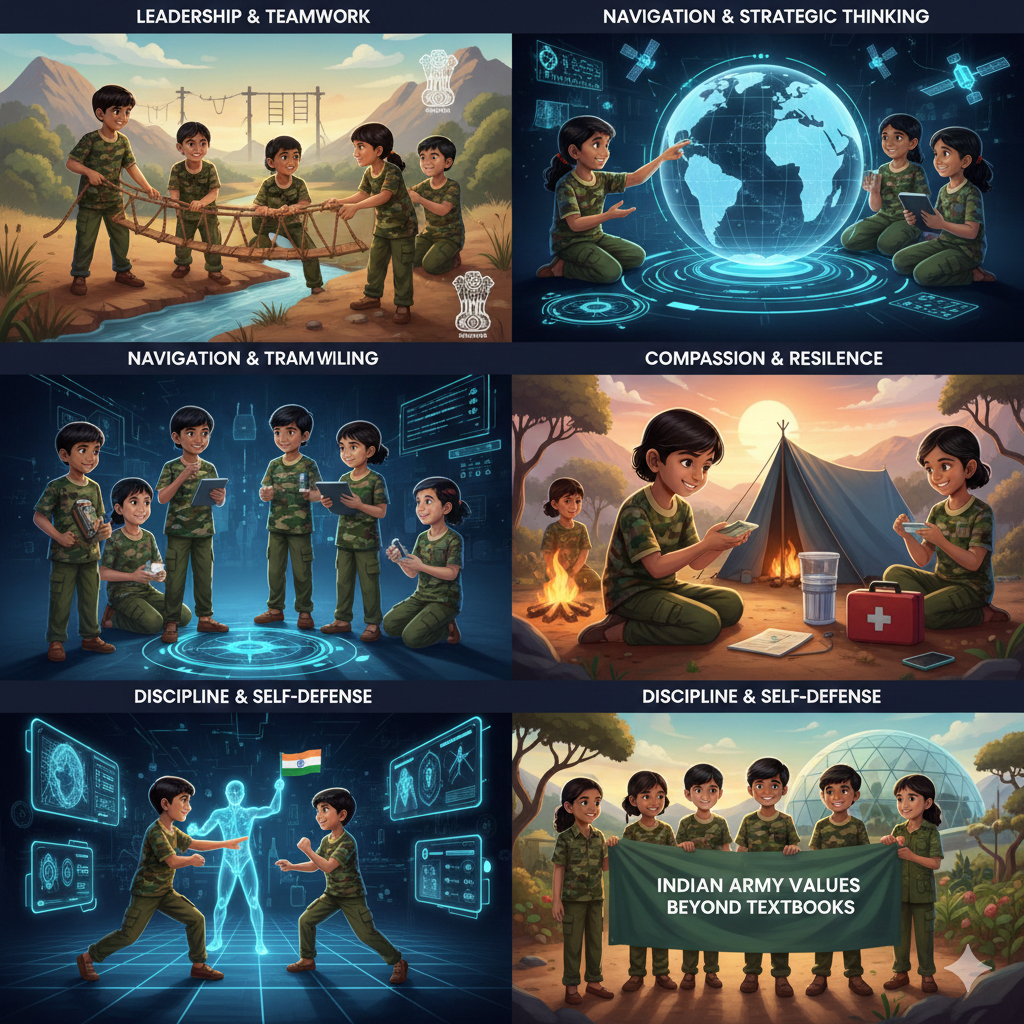
Real-world values will shape the way students see the world around them and what they value most; such as, the Indian Army serves as a living classroom, teaching students leadership, courage, and selflessness through action. Through the actions of each soldier, a student learns that the most important form of leadership comes from being committed to a purpose that is larger than themselves; that leadership is not defined by one’s authority, but rather by the way each individual serves others, holds to their integrity and is steadfast during the most difficult of times.
Discipline is one of the Army’s greatest lessons, but it is also frequently misinterpreted as control. In reality, discipline is a means to provide freedom: freedom to make ethical decisions, act responsibly, and focus when stressed. This lesson of discipline is an essential lesson for children and will help children achieve their true potential through the routines built to help them grow to become trustworthy individuals.
As soldiers, children acquire many skills and knowledge that help them cope with difficult situations and disappointments. They learn how to work together, trust and support each other And recover from their mistakes. All these lessons work together to help a student learn that disappointment is only a step/stage in life; not the finish line. Whether it be in the classroom or on the playground: teaching children emotional strength, working as part of a team and persevering will prepare children not only for the next exam but for life itself.
Patriotism is an action rather than a word. The example of the Indian Army teaches children that love of nation is shown by simple deeds such as being honest, respectful, disciplined and responsible towards one’s community. Schools can make patriotism a part of daily experience instead of just talking about it.
Education needs to model itself after the Indian Army, if it wants to develop citizens who contribute meaningfully to society, and not just create scholarly students. Schools should develop students into people who are self-confident, compassionate, disciplined, generous, strong in values, and are future leaders that support the growth of their country through their successes.
“Discipline and united action are the real source of strength for a nation.” — Field Marshal Sam Manekshaw
About the Author:
Ms. Sonal Sharma is the Principal, Birla Open Minds International School, Yavatmal . She is passionate about empowering both educators and learners by creating engaging, impactful, and innovative training experiences.
Education
AI to Become a Core Subject from Class 3: India’s Big Leap Toward a Future-Ready Generation

In a landmark move to make India’s school system future-ready, the Department of School Education & Literacy (DoSE&L), Ministry of Education, has announced that Artificial Intelligence (AI) and Computational Thinking (CT) will be introduced as part of the school curriculum from Class 3 onwards, beginning in the academic year 2026–27.
The initiative marks a major step in preparing students for an AI-driven world, ensuring early exposure to technological literacy, ethics, and problem-solving. The curriculum, currently being developed through a consultative process with CBSE, NCERT, KVS, NVS, and States/UTs, will fall under the National Curriculum Framework for School Education (NCF-SE) 2023, in alignment with the National Education Policy (NEP) 2020.
A stakeholder consultation held on 29th October 2025 brought together education leaders, including Prof. Karthik Raman from IIT Madras, who heads the CBSE expert committee responsible for shaping the AI & CT curriculum. The focus is on designing a meaningful, inclusive framework that integrates AI not as an advanced elective but as a foundational skill — comparable to literacy and numeracy in importance.
Shri Sanjay Kumar, Secretary, DoSE&L, emphasised that AI education should be viewed as a universal skill closely linked to real-world applications. “Every child’s distinct potential is our priority. Policymakers must define minimum thresholds and evolve them with changing needs,” he said. He also stressed on teacher training as the backbone of successful implementation, with modules under NISHTHA, and resource materials being prepared by NCERT and CBSE.
The Ministry plans to release AI handbooks and digital resources by December 2025, followed by a grade-specific rollout supported by video-based learning materials and structured training.
By embedding AI education from the foundational years, India aims to nurture a generation that understands, creates, and applies technology ethically — transforming the vision of AI for Public Good into everyday classroom reality.
Education
Dharav Utsav to Celebrate Rajasthan’s Cultural Heritage and Local Talent

Education
How to Build Better Parent-Teacher Communication

Good communication between parents and teachers plays an important role in a child’s learning and confidence. When both stay connected, it helps students feel encouraged and understood. Still, it’s not always easy to keep that connection strong. Busy schedules and small misunderstandings can make things tricky. The good news is that a few simple habits can make a real difference. Let’s examine what parent-teacher communication truly entails and how both parties can collaborate more effectively.
What is Teacher and Parent Communication?
Teacher and parent communication is all about staying connected and working together for a child’s growth. It’s not just a one-time meeting or message but a continuous, two-way exchange of updates, ideas, and feedback. When teachers and families stay in touch regularly, it creates a strong support system that helps students do better both in and outside the classroom.
In simple terms, teachers share what’s happening at school, like:
- Homework and assignments
- Grades and test results
- Class activities and behavior updates
- Social and emotional progress
- Strengths and areas where a student might need extra help
At the same time, parents share what’s happening at home, such as:
- How the child feels about schoolwork
- Any challenges or changes they’ve noticed
- Questions or suggestions about learning support
When both sides keep the communication open, it builds trust and teamwork. Teachers understand students better, and parents feel more involved in their child’s education.
Tips for Smooth Parent-Teacher Communication
Talking to parents doesn’t have to feel formal or uncomfortable. In fact, the better your connection with them, the smoother your teaching journey becomes. Whether you’re reaching out for the first time or trying to keep the conversation going, here are some real-world ways to build trust and keep communication easy, clear, and helpful.
1. Begin with a Friendly Introduction
Right at the beginning of the academic year, take a moment to introduce yourself to parents. You can send a friendly email, a printed note, or even a short video message. Let them know who you are, what you’re excited about, and how they can reach you. This early step breaks the ice and helps parents feel welcome and included in their child’s learning journey. When you set a positive tone early, it makes future communication easier and more comfortable for everyone.
2. Communicate Often, Not Just When There’s a Problem
Don’t let communication only happen during parent-teacher conferences or when something goes wrong. Send regular updates about what’s happening in class, upcoming events, or even small successes their child has had during the week. These don’t need to be long messages. A quick note about a student’s progress or behavior can make a parent’s day and help build trust over time. It also shows that you’re not just reaching out when there’s a problem.
3. Invite Their Voice, Too
Sometimes we forget that parents know their child better than anyone else. Ask questions. How does their child learn best at home? Are there any routines or challenges you should know about? And when they speak, listen fully. These conversations often reveal things that can shape how you teach and connect with the student.
4. Be Available and Approachable
Parents need to know that they can come to you when something is on their mind. That doesn’t mean being available 24/7, but it does mean creating space for honest conversations. You can let them know about your preferred times for calls or meetings, and also offer virtual options if in-person isn’t possible. Make sure the tone of your communication is always warm and non-judgmental so they feel safe speaking up.
5. Treat Parents as Team Members, Not Outsiders
Instead of just delivering information, try to involve parents as partners in their child’s learning. Share ideas for how they can help at home, ask for their observations, and thank them for their efforts. If there’s a behaviour issue or academic challenge, work with them on solutions instead of just reporting the problem. A strong home-school partnership creates a consistent support system for the student, both inside and outside the classroom.
6. Show Cultural Awareness and Respect
Families come from many different backgrounds, and their expectations may vary. Take the time to learn about their culture, language preferences, and family structure. Avoid making assumptions or using language that might feel exclusive. If needed, provide translations or simplify your communication to make sure everyone understands. This small effort shows parents that you value who they are and where they come from.
7. Share Progress in a Way That’s Clear and Supportive
Progress updates should be balanced. Yes, it’s important to point out what’s not working, but don’t forget to highlight what is. Give specific examples instead of vague praise or criticism. Say things like, “I’ve noticed Priya really lights up during science experiments,” or “Rohan is still working on staying focused during group tasks.” This kind of feedback feels personal and helps parents understand the full picture.
8. Choose the Right Tools for the Right Message
Too many apps or tools can overwhelm parents quickly. Choose one or two that you’ll stick to, whether it’s a school app, WhatsApp group, or weekly email. Use them for quick updates, reminders, or sharing student wins. Keep your tone casual but clear. Tech is helpful only when it makes life easier for both sides.
9. Respect Their Time and Yours
Teachers and parents are both juggling busy schedules. Respecting each other’s time helps keep communication productive and stress-free. If you’re scheduling meetings, offer time slots that work for working parents, too. Keep conversations focused so that meetings don’t run longer than necessary. Also, set clear boundaries about when you’re available.
When Is Parent-Teacher Communication Most Important?
Parent-teacher communication matters most right at the start of preschool. That first day of preschool is a big moment for every child and their family. When teachers and parents talk openly from day one, it helps everyone feel more comfortable and sets up a strong partnership for the rest of the year.
Why It Matters on Day One
- The first day of preschool often brings a mix of excitement and nervousness for both kids and parents. Honest communication helps everyone feel a little more comfortable.
- Open communication lets teachers learn about each child’s background, interests, and any worries or comforts. This way, teachers can give more personalized care and support from the beginning.
- Early conversations help build a sense of trust between home and school, making the classroom feel like a safe and welcoming place for the child.
- When teachers share classroom routines and expectations with parents on the first day, it helps families get ready and feel involved in their child’s new experience.
- These early talks also give teachers helpful details, like which languages are spoken at home, special family traditions, or any recent changes in the child’s life. This helps teachers communicate better and offer the right kind of support.
By making communication a priority from the very first day, both teachers and parents can work together to help each child settle in smoothly and feel confident as they start their schooling journey. Building strong parent-teacher teamwork not only supports a child’s emotional well-being but also lays the foundation for long-term academic success.
Closing Thoughts
We hope these tips help make your conversations with parents smoother and more meaningful. Building that connection takes time, but small efforts can lead to strong partnerships.
This article is authored by-
Chitra Khanna,
Content Strategist,
KLAY Preschools & Daycare
Education
Beyond the Syllabus: School Teachers’ Insights on Project-Based Learning

How classroom experiences are being reshaped through projects, inquiry, and authentic learning
As the classroom grows beyond the boundaries of textbooks and blackboards, so too does the role of the teacher, and the very meaning of learning. Project-Based Learning (PBL), once considered a niche innovation, is increasingly being embraced by educators across schools in India. But what happens when PBL moves from theory to practice?
To answer this, we turned to the people at the heart of the learning experience: teachers.
In conversations with educators from diverse school contexts, one theme was clear: PBL is not just a teaching strategy; it’s a transformation in how students learn, engage, and grow.
From Worksheets to Real-World Work: How PBL Differs from Traditional Homework
One of the clearest contrasts teachers observed was how PBL moves learning from repetition to relevance. Traditional homework often reinforces information through rote exercises. PBL, by contrast, asks students to apply their knowledge to solve problems, create products, or investigate issues that matter to them.
One teacher shared how using PBL to raise student awareness about water pollution was a hit in the class. Instead of just assigning problems, the students were made to create awareness posters, conduct surveys in their neighbourhood, and suggest solutions through group presentations. The teacher also noted how the students took the lead, and had an ownership over this project that they usually don’t showcase.
The shift from repetition to application fosters deeper engagement. Several teachers noted that students who previously struggled to stay motivated with homework showed renewed interest when asked to take on real-world challenges.
Changing Roles: Teachers as Facilitators, Not Just Instructors
Project-Based Learning also changes the role of the teacher, who went from being the sole source of knowledge to a guide who supports inquiry and exploration.
One common change teachers noticed was on how they had to let go of control in the classroom. Naturally, the students now had to work on projects on their own, and could only come to the teacher for guidance and help. The teachers noted that they helped their students ask the right questions, find credible sources, and evaluate their work, instead of completely placing the burden of learning on the teacher themselves.
This change isn’t always easy. It requires a shift in mindset and in many cases, rethinking how time is used in class. But most teachers agree: the shift is worth it. PBL has encouraged interdisciplinary approaches, made space for collaborative learning, and created more meaningful student-teacher interactions.
Unlocking Student Potential: What PBL Offers Beyond Academics
Academic performance remains important, but a lot of teachers repeatedly pointed out that PBL nurtures a broader set of skills, like critical thinking, collaboration, communication, and creativity. One teacher particularly noted on how their quietest students became ‘leaders’, and became outspoken when it came to presenting their ideas and projects. While not directly, PBL helped these students find their voices, and find confidence in their effort and abilities.
Students learn to manage time, negotiate roles, and solve problems, skills that aren’t always reflected in exam scores but are vital for life beyond school. For many teachers, the most rewarding aspect of PBL was watching students take initiative, work through failure, and reflect on their learning.
Widening the Circle: Strategies for Scaling PBL in More Classrooms
While the benefits are clear, teachers acknowledged that implementing PBL at a large scale comes with challenges, like limited time, rigid curriculum structures, and unfamiliarity among teachers.
They offered a few practical suggestions for schools and educators considering wider adoption:
- Start Small and Build Confidence: Starting with short projects aligned to the unit you are already teaching introduces PBL in an easy manner. This way, teachers do not have to worry about overhauling their curriculum, or for making huge changes to their current teaching methods.
- Encourage Collaboration Among Teachers: Joint planning across subjects makes projects richer and more integrated. This also promotes interdisciplinary skills among students, and allows them to craft solutions using different subjects and skillsets.
- Make Time for Reflection: Embedding opportunities for students to present, critique, and reflect helps solidify learning. By reflecting on their projects and mistakes, they can understand how they can improve their approach to PBL.
- Support Professional Development: Teachers emphasized the need for ongoing training, not just one-off workshops but long-term spaces for peer sharing and mentorship. This continuous development would cement and solidify the methods and outcomes that will maximise using PBL for student benefits
Looking Ahead: Redefining Success in Education
PBL challenges traditional ideas of what learning looks like. It pushes students to move beyond memorization, and it challenges teachers to rethink their methods. But more than anything, it opens up the classroom to ideas, to communities, and to possibilities. No longer are students just preparing for exams, but also for the complex world outside school.
As educators continue to navigate the changing landscape of education, the insights from teachers point us toward a hopeful future, where learning is meaningful, relevant, and rooted in real-world experience.
This article is authored by Mrs. Padmashini M Patro, Principal, Air Force School Bamrauli
-

 Inspiration3 months ago
Inspiration3 months agoUmeed: A Ray of Hope for Better Tomorrow
-

 Knowledge2 months ago
Knowledge2 months agoBuilding a Healthier India: Why School Health Programs Are Essential
-

 Inspiration2 months ago
Inspiration2 months agoBefore the Nobel, There Was a Teacher
-

 Education2 months ago
Education2 months agoWhat the Indian Army Teaches Our Children Beyond Textbooks
-

 News1 month ago
News1 month agoInclusive Education Summit 2026: Designing the Future of “Learner-Centric” Education
-

 Education1 month ago
Education1 month agoBeyond the First Bell: 5 Key Takeaways for School Leaders from Economic Survey 2025–26
-

 Education1 month ago
Education1 month agoSupreme Court’s Landmark Judgment for Schools: Menstrual Health is a Fundamental Right
-
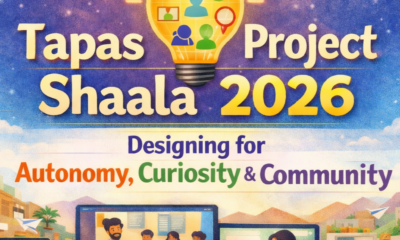
 Education2 weeks ago
Education2 weeks agoTapas Project Shaala 2026 to Spark National Dialogue on Autonomy, Curiosity and Community in Education
-

 Education3 weeks ago
Education3 weeks agoJudicial Guardrails: How the J&K High Court’s Fee Regulation Verdict Redraws the Rules for Private Schools
-
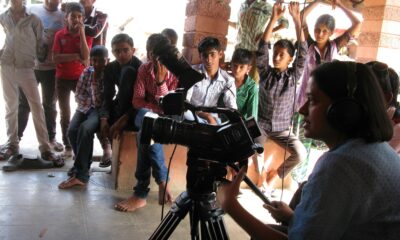
 Education1 week ago
Education1 week agoDaring to Dream: Six Years in the Heart of Rural Rajasthan

















